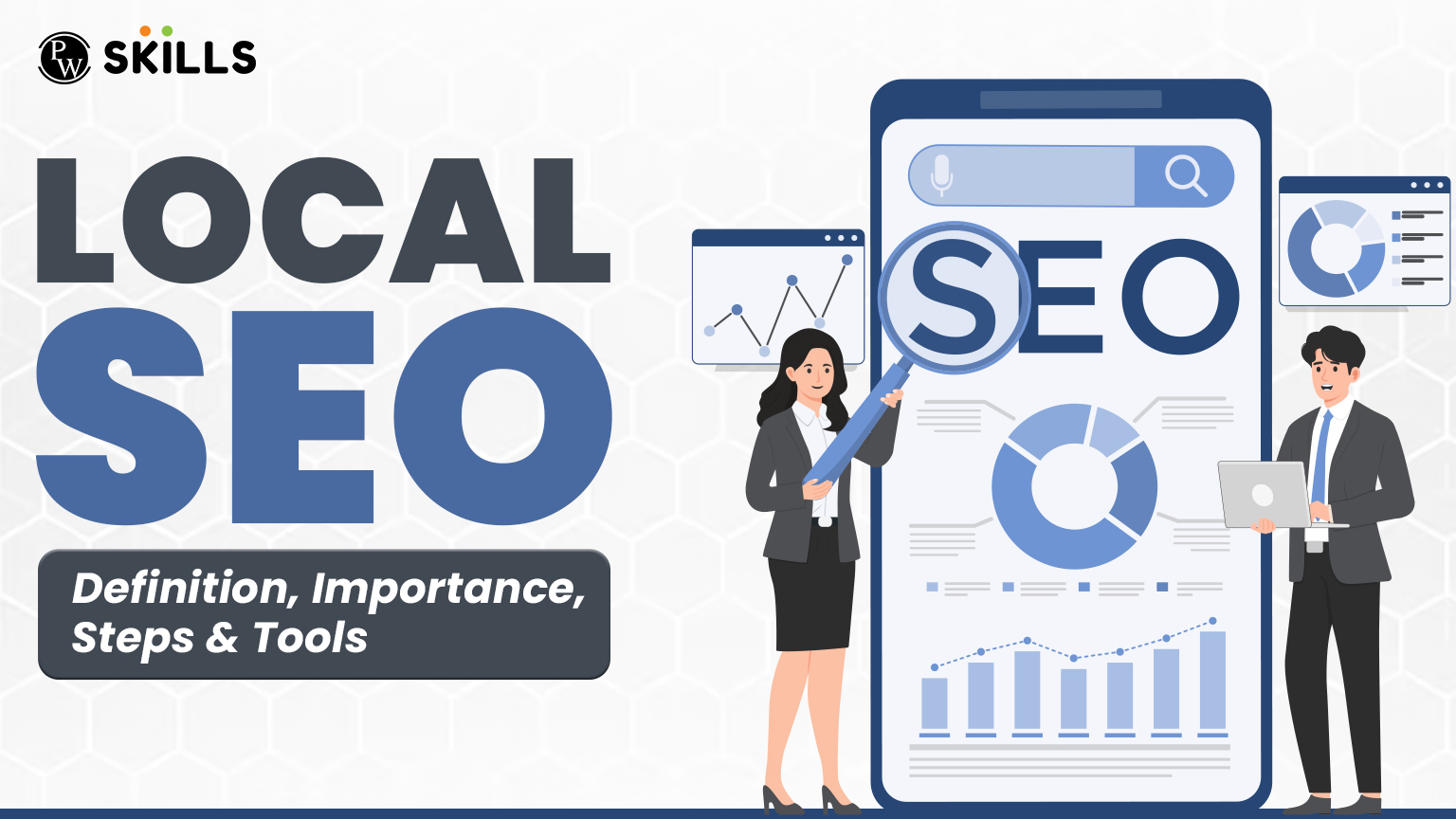Local SEO refers to the practice of optimizing a website and online presence to improve visibility in local search results. It focuses on increasing the likelihood of appearing in search results when potential customers search for businesses or services within a specific geographic area. In today’s digital world, Local SEO is essential for small businesses, brick-and-mortar stores, and service providers looking to attract local customers.
By improving local search rankings, businesses can drive foot traffic, increase phone inquiries, and boost online engagement. Effective Local SEO involves a combination of tactics, including keyword optimization, Google My Business management, customer reviews, and building local backlinks. In this guide, we’ll explore the importance of Local SEO, its key steps, and the tools that can help businesses rank higher and stand out in local search results.
What is Local SEO
Local SEO (Search Engine Optimization) is the practice of optimizing a website or online presence to improve its visibility in local search results. It focuses on attracting customers from specific geographic areas, such as cities or neighborhoods. Local SEO involves optimizing your website for location-based keywords, claiming and updating your Google My Business profile, encouraging customer reviews, and ensuring that your business name, address, and phone number (NAP) are consistent across online directories.
By improving local SEO, businesses can enhance their chances of appearing in local search results, Google Maps, and local packs, driving more foot traffic and local leads.
Importance of Local SEO
Local SEO (Search Engine Optimization) is crucial for businesses that rely on local customers or operate within specific geographical areas. Here’s why it’s important:
1. Increased Visibility in Local Search Results
When people search for products or services “near me,” Google and other search engines prioritize local businesses. Optimizing for local SEO helps ensure your business appears in local search results and on Google Maps, making it easier for potential customers to find you.
2. Targeted Audience Reach
Local SEO allows you to target customers in your area who are more likely to convert. This is especially valuable for businesses like restaurants, stores, and service providers that serve specific geographic locations.
3. Improved Google My Business (GMB) Presence
One of the key components of local SEO is optimizing your Google My Business profile. This profile enhances your online visibility by providing important business details like location, hours of operation, reviews, and more. A complete and active GMB profile can significantly improve your local ranking.
4. Boosted Foot Traffic and Conversions
Local SEO strategies, such as optimizing for mobile search and “near me” queries, can drive more physical visits to your business. When potential customers find your business online and can easily access it in person, you increase the likelihood of conversions.
5. Better Online Reviews
Reviews play a huge role in local SEO rankings. Google and other search engines take customer reviews into account when determining rankings. By encouraging customers to leave positive reviews, you not only build credibility but also enhance your local SEO presence.
6. Competitive Advantage
Many businesses neglect local SEO, leaving the door open for you to take advantage of local search opportunities. By optimizing your online presence for local searches, you can outperform competitors who may not have a strong local SEO strategy.
7. Cost-Effective Marketing
Local SEO is typically more affordable than traditional advertising methods (like billboards or print ads), especially for small businesses. It allows businesses to maximize their reach with lower costs, focusing on customers who are already looking for what they offer.
8. Increased Mobile Traffic
More and more consumers search for local businesses using mobile devices. Local SEO ensures your business is easily discoverable on smartphones, which is essential in today’s increasingly mobile-driven world.
9. Engagement with the Local Community
By focusing on local SEO, businesses can create more meaningful connections with their community. This can foster customer loyalty, encourage word-of-mouth referrals, and strengthen your brand’s reputation in the area.
10. Better User Experience
Local SEO helps optimize your website’s content to meet the needs of users searching for local information. This improves the overall user experience and ensures your site provides relevant and easily accessible information about your products or services.
Steps for Local SEO
Local SEO (Search Engine Optimization) is the practice of optimizing your online presence to attract more business from relevant local searches. Whether you’re a small local business or a larger company with multiple locations, local SEO helps you improve your visibility in search engine results when users search for products or services near them. Below are the key steps to enhance your local SEO and ensure your business stands out in local search results.
Step 1: Claim Google My Business
To feature your business in Google search results, the first step is claiming your Google My Business (GMB) profile. This free tool allows business owners to showcase their business in local searches. To do this, provide essential details such as your business name, website address, map location, phone number, and information about your products and services. Submitting these details helps ensure your business appears across Google Search, Google Maps, and more.
Step 2: Google Search Console and Google Analytics
Once your website is live, sign up for Google Search Console and Google Analytics. Google Search Console allows you to monitor website issues and track performance, helping you identify and fix problems that could affect your Local SEO rankings. Google Analytics provides insights into your website traffic and user behavior, allowing you to better understand how visitors interact with your site and optimize accordingly.
Step 3: Keyword Research is Essential
Effective Local SEO begins with thorough keyword research. Keywords are the search terms users type into Google to find relevant businesses or services. Use tools like Google Keyword Planner, SEMrush, or Ahrefs to discover keywords that are relevant to your business and local area. Incorporate both short-tail and long-tail keywords into your content, titles, descriptions, and meta tags to improve your site’s visibility and relevance in local searches.
Step 4: On-Page and Off-Page Optimization
To boost your rankings in local search, focus on both on-page and off-page SEO techniques.
On-page SEO: This includes optimizing elements within your website, such as meta tags, image compression, content quality, CSS, JavaScript, and ensuring fast page load speeds. You should also check for broken links and optimize your internal linking structure.
Off-page SEO: This involves actions taken outside of your website to improve its authority and relevance. These include guest posts, local business listings, social media engagement, and citations from reputable directories.
Step 5: Link-Building
Link-building is a critical part of off-page SEO. Linking your website to other authoritative and relevant local websites or directories can improve your search rankings. Ensure you target websites with a high Domain Authority (DA) and low spam scores. Use specific search operators to find local business directories and sites related to your niche for link-building opportunities that strengthen your Local SEO.
Step 6: Positive Reviews and Ratings
Customer reviews play a significant role in Local SEO. Positive reviews from satisfied customers can help improve your rankings and reputation. Encouraging reviews on platforms like Google, Yelp, and Facebook builds trust with potential customers. Responding to both positive and negative reviews shows that you value customer feedback and helps build credibility.
Step 7: Engage Over Social Media Platforms
Social media engagement strengthens your brand’s online presence. Create profiles for your business on platforms like Facebook, Instagram, Twitter, and others. Regularly post engaging content that appeals to your target audience, and consider collaborating with influencers or local personalities to expand your reach. Social media signals indirectly influence your Local SEO performance by increasing brand awareness and driving more traffic to your website.
Tools for Local SEO
There are several tools available to enhance your Local SEO efforts, each offering unique features to improve your business’s online presence in local search results.
- Google My Business: This tool offers valuable insights into your business’s performance, allows for post scheduling, and helps manage customer reviews effectively. It plays a crucial role in improving Local SEO by optimizing your business profile for better visibility in local search results.
- Moz Local: Moz Local helps businesses manage their local listings and citations across various platforms, ensuring consistency and improving local search rankings. It is especially useful for optimizing your Local SEO strategy by keeping your business information up-to-date.
- SEMrush: SEMrush provides comprehensive tools for Local SEO keyword research, competitor analysis, and tracking local search rankings. It helps you identify key local keywords and monitor how your business performs compared to competitors in local search results.
- BrightLocal: This platform is ideal for conducting Local SEO audits and monitoring local rankings. It offers tools for reviewing business listings, managing reviews, and tracking local search performance, all of which are crucial for maintaining a strong local presence.
- Whitespark: Whitespark specializes in citation building and tracking, which is essential for improving your local search rankings. Citation consistency plays a significant role in Local SEO, and Whitespark helps ensure that your business is properly listed across relevant directories.
- Yext: Yext helps businesses manage their local data and ensures that business information remains consistent across multiple directories and platforms. Consistency in business listings is a key factor in optimizing Local SEO and boosting local search visibility.
- Ahrefs: While primarily known for backlink analysis and keyword research, Ahrefs also provides valuable insights for Local SEO. By analyzing local backlinks and identifying local keyword opportunities, Ahrefs can help you improve your search rankings in specific geographic areas.
Learn Digital Marketing with PW Skills
Begin your journey into digital marketing by enrolling in our comprehensive Digital Marketing Course. This program is designed for beginners, freshers, and working professionals eager to establish themselves as digital marketing experts while harnessing the power of Artificial Intelligence.
Our course offers over 125 hours of learning materials led by industry experts, a career-focused curriculum, interactive doubt-solving sessions, interview preparation, and job assistance. All of these elements are crafted to help you excel in the field of digital marketing. Discover more at pwskills.com.
Google My Business (GMB) is a free tool that allows businesses to manage how they appear in Google search results and Google Maps. It’s essential for Local SEO because it helps businesses get discovered in local searches and improves visibility. Local SEO can take anywhere from a few weeks to several months to show noticeable results, depending on competition, the quality of your SEO efforts, and how well your business is established in the local market. Yes, online reviews significantly impact Local SEO. Positive reviews improve your local search rankings and increase customer trust. Consistent, high-quality reviews also signal to search engines that your business is trustworthy.Local SEO | Definition, Importance, Steps & Tools FAQs
What is Google My Business, and why is it important for Local SEO?
How long does it take to see results from Local SEO?
Do online reviews affect Local SEO?





